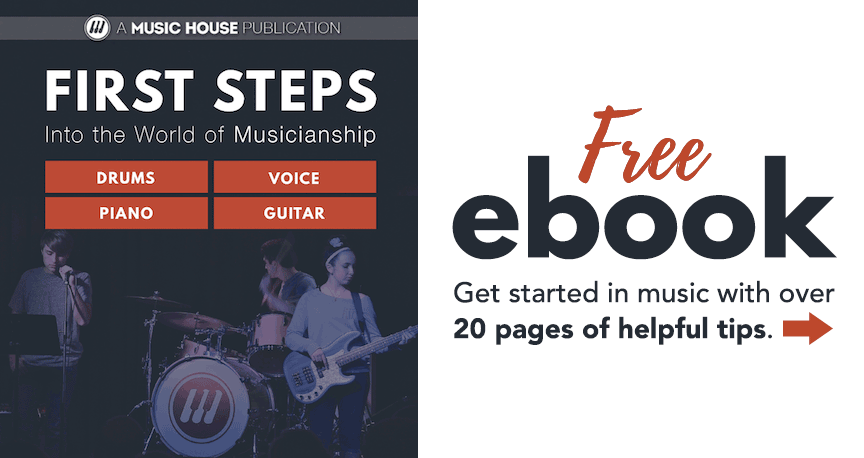Struggling with Performance Anxiety? Check Out These Tips ASAP!

No matter how skilled of a musician you are or how many times you’ve played a show, it is perfectly normal to get the jitters prior to going out on stage. However, if you find that this nervousness inhibits your ability to perform in front of a crowd, this might not just be a little stage fright and instead, a case of performance anxiety. Performing is one of the most fun things about playing music and something that every musician should experience.
Here at Music House, we want all musicians to experience the thrill of performing! That is why we’ve compiled a list of tips that can help you to overcome performance anxiety, including info regarding music lessons in Kansas City. Continue reading to learn more!
Tip #1: Don’t be afraid to admit to your fear.
One of the first major steps in overcoming performance anxiety is admitting that it’s something that you are facing. Being honest with yourself as well as your peers and music instructors can go a long way in helping you to overcome the issue. Ignoring it won’t make it go away. In fact, it may even make it worse.
Not sure if you fit the bill for performance anxiety? These are just a few of the physical symptoms that one might normally experience with dealing with performance anxiety:
- Excessive sweating
- Nausea, heartburn, or other stomach issues
- Dry mouth/’cotton’ mouth
- Elevated heart rate and heavy breathing
- Shaky hands/limbs or even a shaky voice
- Blurred vision
While this is not a comprehensive list, if you are experiencing some or all of the symptoms listed prior to going on stage, odds are high that you have performance anxiety. This anxiety can take a huge toll on your mental health. The sooner you can identify the issue, the sooner you can get on top of tackling it.
Tip #2: Create a mindfulness routine.
If you’ve been a musician a while, you have probably heard someone say ‘that person is too much in their head’, especially after a lackluster performance. Our anxiety has a way of tricking us into believing things that just aren’t true, which could lead to accidental self sabotage. One way to overcome this is by practicing mindfulness.
When negative thoughts run away from us, it’s never a good feeling. Mindfulness, or sometimes known as ‘meditation’, forces you to sit down and comfort these feelings head on, including taking a look at the good, the bad, and the ugly. By sifting through these thoughts, you can separate fact from fiction and pinpoint the thoughts you want to get rid of. Take the time to curate a quiet, comfortable space where you can relax and focus your mind. Doing this routinely is important, especially in the days leading up to a performance.
Tip #3: Make stress your friend.
While the term ‘stress’ typically denotes something negative, it does exist for a reason. Stress refers to the body’s fight or flight response which is used to keep us safe in dangerous or difficult situations. While this is well and good, it’s usually not ideal for a situation such as a piano recital. You don’t need to be in survival mode to play the drums or jam on stage with your friends.
Instead, harness and channel that stress and adrenaline into committing to practice and perfecting your pieces. Practice daily affirmations and reassure yourself that things will be okay, even if you do make a mistake or two. Knowing when you are stressed is going to help you manage it better.
Tip #4: Pinpoint what exactly makes you so anxious about performing.
When it comes to what triggers your anxiety, there is no right or wrong answer. It can look different from person to person. For example, while one musician might fear making a mistake because they are a perfectionist, another might feel stressed out about being the center of attention. Getting to the root of the issue will better help you manage this anxiety and face it head on. Talk to your bandmates, peers, or if you’re taking music lessons in Kansas City, share your thoughts with your instructor. They are all there to support you and cheer on your success!
Tip #5: Keep getting on stage.
While we know this is easier said than done, for those with performance anxiety and nervous jitters, sometimes exposure is the best option. For many people, performing in front of others is difficult simply because they haven’t done much of it before. Just about anyone is nervous the first few times they try something new!
For best practice, start off booking small gigs or hosting a show for close family or friends. By keeping the crowd small and intimate, you can build up the confidence needed to perform in front of a bigger audience.

Tip #6: Remember to take a deep breath.
As cliche as it might sound, taking a deep breath prior to getting on stage can really make a huge difference. Erratic breathing can lead to a full blown panic attack, which is something no one wants to experience. Take a few minutes before going up to focus on your breathing; in through the nose and out through your mouth. Have a peer or bandmate breathe with you and match the pace of your breaths. This practice will allow you to clear your mind and focus on what’s in front of you.
Tip #7: Take music lessons in Kansas City.
Last but certainly not least, one of our best pieces of advice is to take private music lessons. Working one on one with an instructor will help you iron out any issues you may have in technique as well develop new skills. Music lessons will also allow you to develop more confidence in yourself as well as your playing. Plus, whenever you perform, you know a friendly face will be watching from the crowd!
If you’re interested in taking music lessons in Kansas City, be sure to contact our teamat Music House today! Private lessons are available for vocal, drums, guitar, and so much more. If you’re ready to tackle your performance anxiety, allow one of our incredible instructors to help you out.

